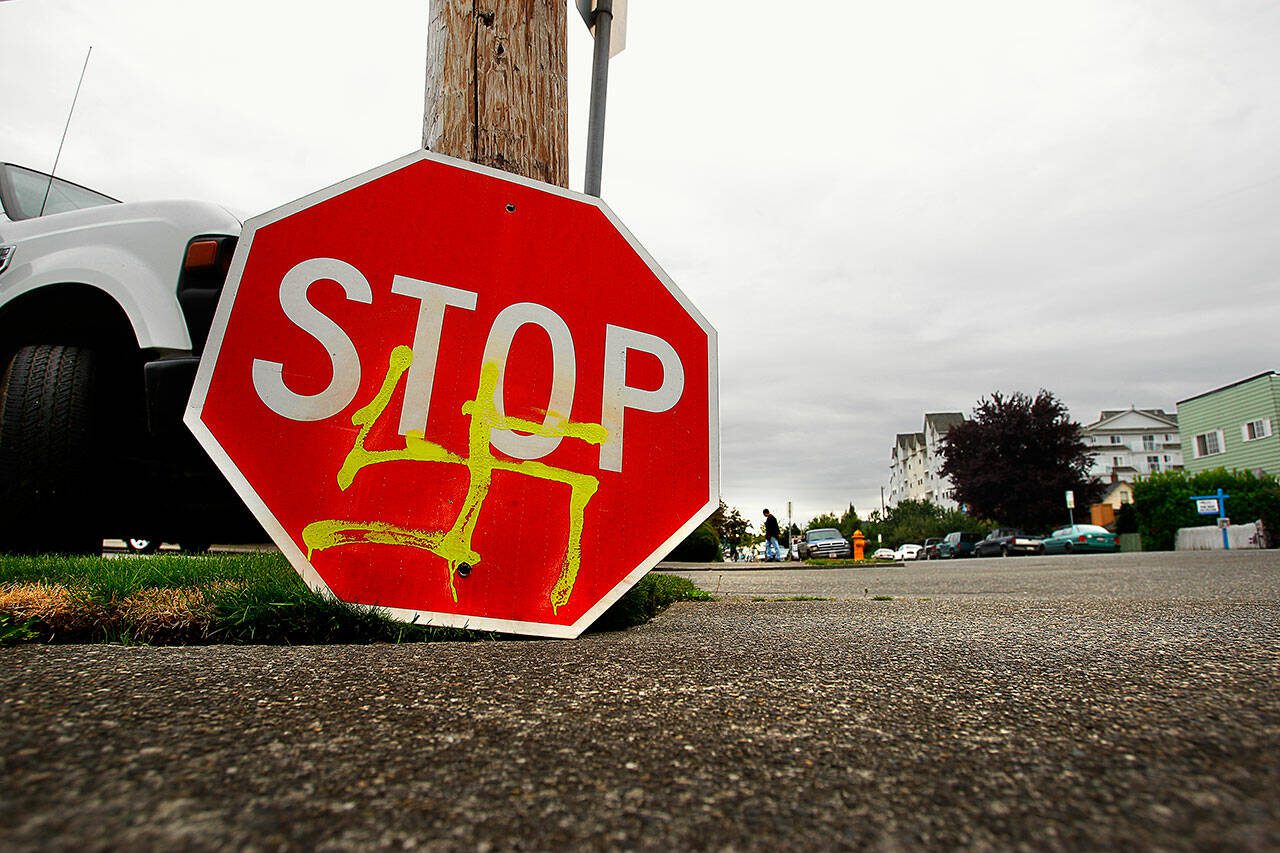By The Herald Editorial Board
The warning, given by a Cle Elum man — his chest emblazoned with a swastika and the Nazi eagle symbol — to an Edmonds police office who arrested the man in November 2021 for spewing racist slurs and making threatening actions against an animal control officer might have been dismissed as a bully’s bluster.
“I follow orders too,” Sean Wagner, then 34, told the police officer, according to court documents. “It’s coming. We’re just waiting for the right moment, but it’s coming. When the order is given, you won’t be able to do anything about it. We’ll win.”
A jury understood it as more than bluster and convicted the man of a hate crime for the threats against the animal control officer. Wagner was sentenced in November of last year to nine months confinement, the high end of the state sentencing range.
Nor can the incident be dismissed as an outlier, not for Snohomish County and not for Washington state. Statistics from the U.S. Department of Justice’s most recent report on hate crimes, show the total number of hate crimes in the state increased from 462 in 2020 to 651 in 2021 and 590 in 2022. Likewise, hate crimes based on race, ethnicity or ancestry increased from 309 in 2020 to 448 in 2021 and 373 in 2022, while those involving sexual orientation increased from 67 in 2020 to 103 in 2022; and those regarding gender identity from 23 in 2020 to 40 in 2022.
State lawmakers, during the session that wrapped up last month, had a response in hand that promised a path toward better understanding the threat of what the FBI and Department of Homeland Security now call domestic violent extremism and toward developing an approach that sought to improve collection of data and statistics around hate crimes and incidents and propose solutions, including an innovative public-health strategy toward prevention of extremism.
First proposed in 2023 by state Attorney General Bob Ferguson following a six-month study by his office that the Legislature had requested, House Bill 1333 would have created a state Commission on Domestic Violent Extremism, which over two years would have brought together representatives of the office and other government officials, civil rights groups and law enforcement to:
Identify data-tracking recommendations around violent extremism and ensure its equitable use;
Review civil and criminal legal tools and recommended new legislation and regulations; and
Identify community-led and evidenced-based solutions to combat disinformation and misinformation, address early signs of radicalization and develop public-health responses.
Ferguson, in discussing the legislation last year on the “PBS News Hour,” said he saw a need to take a broader approach to “address things that are not specifically a threat to somebody, but where the state can take some action in prevention, for example, take a more holistic approach, a public health approach, to address what we all see and know is happening in communities all across the country.”
As part of that public health approach, the attorney general’s report recommended measures through which the state Department of Health could work with community groups to support intervention teams that would allow families and others to refer someone they suspect of being on the path toward radicalization and violence for redirection through voluntary intervention.
It also advised training for the state’s Department of Corrections probation officers to help those in their supervision to avoid extremism; and would further use the public health model of prevention to address radicalization before it takes root, using civic education, media literacy and resilience against online content, propaganda and intentional disinformation.
The legislation failed to get to the House floor in 2023 and was reintroduced this year but saw no further consideration. That is, until later in the budget process when lawmakers allocated $247,000 to the Office of the Attorney General to fund a task force to take on the work of the proposed commission. That money was included in the supplemental budget signed last week by the governor.
Funding the panel isn’t the full-throated endorsement and support the issue deserves, but it allows Ferguson’s office, which has already invested effort into the project, to continue the work and the conversation. The challenge for the task force, however, may be in pursuing its findings and recommendations next year before the Legislature and before a new attorney general once Ferguson has left the AG’s office.
It’s not a stretch to view hate crimes and domestic violent extremism as a societal disease, nor to address it and confront it as a public health concern; its spread within families and among co-workers and associates calls on comparisons to a contagion.
The nature of acts of hate and extremism carry long-term and damaging consequences for victims, communities and even perpetrators that require a response that delivers public education, methods for prevention and opportunities for diversion, for which the task force can continue that work.
Talk to us
> Give us your news tips.
> Send us a letter to the editor.
> More Herald contact information.

























